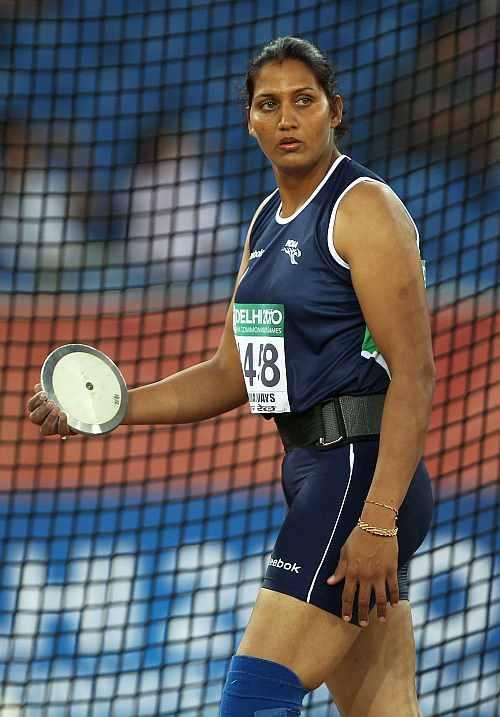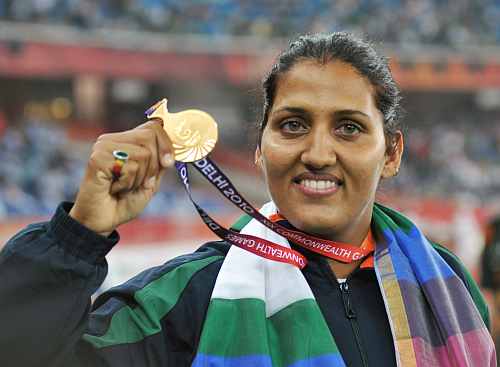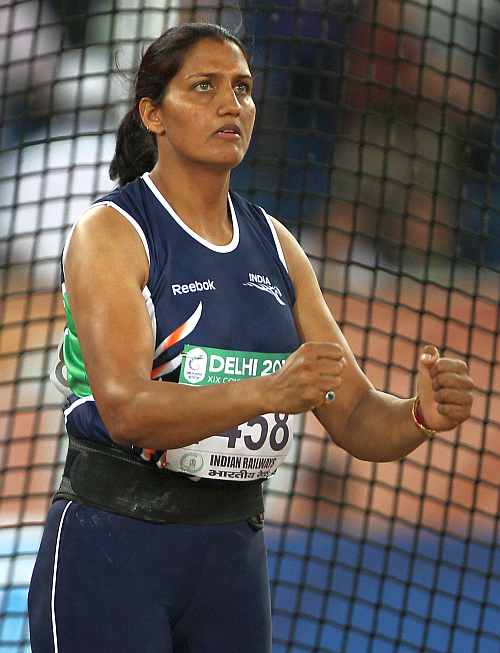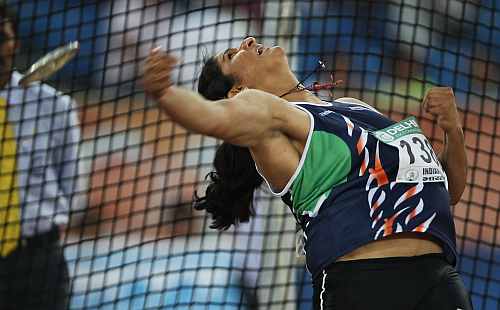 | « Back to article | Print this article |
Meticulous planning key to success in Olympics: Poonia
Winning a medal in the Olympics is a "lifetime dream" for India's top discus thrower Krishna Poonia, who is "meticulously planning" her every move to brighten her podium chances in London.
Fully aware of the pressure associated with a mega-event like the Olympics, Poonia plans to enter the Games Village as late as possible to keep herself in the training mode ahead of the actual competition, which will be held on August 3 and 4 at the showpiece London Olympic Stadium.
"Winning an Olympic medal is a lifetime dream. It's all about meticulous planning, from where to train to when to enter the Games Village," she told from Basildon, at the outskirts of London, where she is training.
"I am here in London much before any Indian athlete but I don't want to be in the Olympics mode yet because of the pressure associated with it. I want to enter the Village as late as possible," she added.
'There is pressure in all international competitions'
Poonia hurled the discus to her personal best of 64.76m at Wailuku, Hawai Islands in the United States in May but she knows in order to win a medal in London she will have to clear the 65m mark.
"I have to cross 65m if I have to have any chance of a medal in London. I am doing above 65m during training," said the 30-year-old Commonwealth Games gold medallist.
"There is pressure in all international competitions and an athlete will have to cope with it. But Olympics is something different, it's the biggest stage.
"So pressure will be huge and I want to avoid pressure as much as possible," said Poonia, who in 2010 became the first Indian woman to win an individual gold in Commonwealth Games in New Delhi.
'I don't want to put myself under pressure'
Poonia is at number nine in the latest IAAF rankings, and all eight ahead of her have above 65m personal best, with Germany's Nadine Muller leading the chart with 68.89m.
The Indian said she had been undergoing yoga and other mental exercises during her training in the United States under 1976 Olympic champion Mac Wilkins so that she concentrates on her throw during the Olympics.
"Concentration is the most important thing to get the distance. I do yoga especially breathing exercises and meditation in the United Sates (at Portland where she had a three-month training). I also had regular discussion with Virender (her husband-cum-coach) and Mac Wilkins (at the training centre at Portland in US)," she said.
She, however, keeps away from following what the other season leaders were doing so that she does not feel the pressure.
"I don't want to follow what Nadine Muller or Sandra Perkovic or Stephanie Brown Trafton (Beijing Games gold medallist from United Sates) are doing. That will put pressure on me. I want to concentrate on my strength," she said.
"I don't want to put myself under pressure. I don't want to think that I can become the first Indian track and field athlete to win an Olympic medal. People may have expectations after my Commonwealth Games feat but for me I will be happy if I give my 100 per cent," she added.
'Preparations have been going on satisfactorily'
Set to take part in her second Olympics after the 2008 Beijing Games, Poonia said she made minor adjustments in her technique at the training centre in the United States.
"My preparations have been going on satisfactorily and I thank the government and federation for this. In the United States I worked on physically fitness as well as making minor adjustments on my technique. I worked on increasing my leg strength and adjusting on the radius of release and long release (of the discus) etc," said Poonia.
Poonia's role model in her sport is former world record holder Wolfgang Schmidt who won a silver for erstwhile East Germany in 1976 Montreal Olympics and she says she also watches video footages of Neelam Jaswant Singh, a former Asian champion and 2002 Busan Asian Games gold medallist.
"I am a fan of Wolfgang and I like his throwing style. I also used to see footages of Neelam Jaswant, who has medals for the country," she said.
Asked about the profile of athletics in the country and the facilities in India, Poonia said, "This time the government has done a great job by sending abroad for training those who have qualified for the Olympics. But it's a long way to go in terms of world-class facilities."



